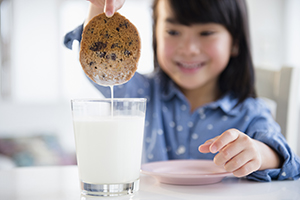Why Parents Shouldn't Use Food as Reward or Punishment
It's common for parents to offer a "special"—and often unhealthy—food as a reward for good behavior or a job well done. They may also withhold those special treats as a means of punishment. A parent might refuse to serve dessert, for example, if their children have talked back or haven't cleaned their rooms.
Using food as a reward or as a punishment, however, can undermine the healthy eating habits that you're trying to teach your children. Giving sweets, chips, or soda as a reward often leads to children overeating foods that are high in sugar, fat, and empty calories. Worse, it interferes with kids' natural ability to regulate their eating. It also encourages them to eat when they're not hungry to reward themselves.

Offering otherwise off-limits food as a reward or special treat is also confusing. Children hear that they're supposed to enjoy foods that are good for them and stay away from foods with little nutritional value. Being told that they can indulge in foods that are bad for them as a reward for doing something good sends a mixed message. They may also start relating unhealthy foods to certain moods—when you feel good about yourself, for instance, it's OK to reach for a sweet.
More drawbacks to disciplining with food
Offering treats as rewards can also lead to cavities and weight gain. When sweets or chips are given as a reward, they may become more appealing. This leads children to start to prefer them instead of healthier foods with nutritional value.
The practice of forcing children to "clean their plates" as a punishment for bad behavior can encourage them to develop bad eating habits, such as eating when they're not hungry. It can also lead to a distaste for those nutritious foods they're being forced to eat.
Alternative rewards and punishments
Parents can offer a number of other rewards, not related to food, to reinforce good behavior. Involve your child in selecting rewards that are meaningful to them. Consider these creative options:
-
Trip to the library, zoo, or other favorite outing
-
New art supplies or coloring books
-
Pencils, stickers, or other supplies that can be taken to school
-
Special bath toy
-
Listening to their favorite music as a family
-
Extra reading time before bed
-
Play date or sleepover with a friend
-
Playing a favorite game with a parent
Establish healthy habits
Getting young children to eat nutritiously can be a challenge. Try not to force them to eat when they're not hungry or if they don't like a certain food (try offering the same item again at other meals, perhaps cooked a different way). Overall, serve a wide variety of nutrient-rich, kid-friendly foods. Don't show concern or get upset if your child turns down a food. For young children, keep servings small. And for all family members, use portion control and healthy serving sizes.
Finally, make mealtime pleasant. Don't argue, talk about problems, or discipline children at the table. Family meals should be relaxed, happy occasions where you can talk about your children's day and share experiences.